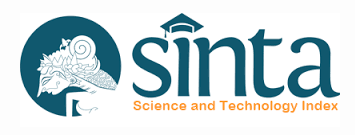PENGGUNAAN FITUR VIDGRAM PADA AKUN @YUFID.TV DI INSTAGRAM SEBAGAI TREN MEDIA DAKWAH
Abstrak
This research is a study that describes the use of Yufid Tv on Vidgram's feature as a trend of communication media. The research objective was to find out the use of vidgram features as a propaganda media trend by Yufid Tv, and to find out the da'wah material given by Yufid Tv on Instagram, as well as to find out the pros and cons of da'wah through Yufid Tv's vidgram feature on Instagram. The results of research conducted on the @ yufid.tv account on Instagram, found that Yufid Tv uses the vidgram feature to upload videos with the type of video poster. The use of the vidgram feature with the video poster model has become a media for propaganda to remain today with several factors, namely: the user's response to video posters, the existence of communities that expect da'wah through video posters, and crews focused on making videos. The da'wah material delivered by Yufid Tv on Instagram includes the material of aqidah, syariat, muamalah, and morality. The advantages of da'wah with the vidgram feature are ease of use of supporting features and tools, attractive interface display, and the impression of light and short content. The disadvantages of this feature are the metadata and content elements that cannot be adjusted like content on other social media, and there is no seekbar on the vidgram feature.Referensi
Al-Quran Al-Karim.
Al-Bayanuniyy, Muhammad Abu al-Fath. al-madkhal ila ‘ilmi al-da’wah. Cet III; Beiruth: Muassatu al-Risalah, 1995.
Amin, Samsul Munir. Ilmu Dakwah. Jakarta: Amzah, 2009.
Al-Sheikh, Abdullah bin Muhammad bin Abdurrahman bin Ishaq. Tafsir Ibnu Katsir, terj. Abdul Ghoffar E.M, vol. 2. Bogor: Pustaka Imam Asy-Syafi’i, 2004.
Arikunto, Suharsimi. Manajemen Penelitian. Jakarta: Rineka Cipta, 2007.
Ayu, Eryta Putri S, “Aplikasi Instagram Sebagai Media Komunikasi Pemsaran Online Shop (Studi Deskriptif Kualitatif Aplikasi Instagram Sebagai Media Komunikasi Pemsaran Online Shop)”, Skripsi. Surabaya: Fakultas Ilmu Sosial dan Ilmu Politik Universitas Pendidikan Nasional “Veteran” Jawa Timur, 2013
Aziz, Moh. Ali. Ilmu Dakwah. Jakarta: Prenada Media, 2004.
Gunawan, Imam. Metode Penelitian Kualitatif Teori & Praktek. Cet, III; Bandung: Alfabeta, 2011.
Hadi, Sutrisno. Metodologi Research 2. Yogyakarta: Andi Offset, 1987.
Hakiki, Rizki. “Dakwah di Media Sosial (Etnografi Virtual Pada Fanpage Facebook KH. Abdullah Gymnastiar)”. Skripsi. Jakarta: Fakultas Ilmu Dakwah dan Ilmu Komunikasi UIN Syarif Hidayatullah, 2016.
Ilaihi, Wahyu . Komunikasi Dakwah. Bandung; Remaja Rosdakarya, 2010. Iskandar. Panduan Lengkap Internet. Jakarta: Andi Publisher, 2009.
Kementerian Agama RI, Al-Qur’an dan Terjemah. Bandung: Syaamil Quran, 2012.
Munawir, Ahmad Warson. Kamus al-Munawi. Surabaya: Pustaka Progresif, 1997.
Munir, Muhammad dan Wahyu Ilaihi, Manajemen Dakwah. Jakarta: Kencana, 2006.
Nasrullah, Rulli. Media Sosial Perspektif Komunikasi, Budaya, dan Sosioteknologi. Bandung: Simbiosa Rekatama Media, 2015.
. Teori dan Riset Media Siber (Cybermedia). Jakarta: Prenada Media Grup, 2014.
Nurudin, Komunikasi Massa. Malang: Cespur, 2003.
Poernomo, Husain Usman. Metodologi Penelitian. Jakarta: Bumi Aksara, 1996. Purwanti, Eneng. “Manajemen Dakwah dan Aplikasinya Bagi Pengembang
Organisasi Dakwah”. Jurnal Adzikra 1, no. 02 (2010): h. 6.
Rahmawati, Dewi. “Pemilihan dan Pemanfaatn Instagram Sebagai Media Komunikasi Pemasaran Online (Studi Deskritif Kualitatif Pada Akun Instagram @FreezyBrowniezz)”. Yogyakarta: Fakultas Ilmu Sosial dan Humaniora UIN Sunan Kalijaga, 2016.
Rohidi, Tjetjep Rohendi. Analisis Data Kualitatif. Jakarta: Penerbit UI, 1992). Saerozi. Ilmu Dakwah. Yogyakarta: Penerbit Ombak, 2013.
Saputra, Wahidin . Pengantar Ilmu Dakwah. Jakarta; PT. Raja Grafindo Persada, 2011.
Severin, Werner J dan James W. Tankard, Teori Komunikasi. Jakarta: Kencana, 2005.
Sugiyono. Metodologi Penelitian Pendidikan, Pendekatan Kuantitatif, Kualitatif, dan R&D. Cet. XXI; Bandung: Alfabeta, 2015.
Taufik, Dr. M. Tata. Dakwah Era Digital: Seri Komunikasi Islam. Kuningan, Jawa Barat: Pustaka Al-Ikhlas, 2013.
Usman, Fadly ”Efektivitas Penggunaan Media Online Sebagai Sarana Dakwah”, Jurnal Ekonomi dan Dakwah Islam (Al-Tsiqoh) 1, no. 1 (Maret, 2016):
Wahid, Fathul. E-Dakwah: Dakwah Melalui Internet. Yogyakarta: Gava Media, 2004.
Wulandari, Eka Nanda. “Popularitas Fashion Hijab Melalui Akun Instagram@Hijabercommunityofficial”. Skripsi. Jakarta: Fak. Ilmu Dakwah dan Komunikasi UIN Syarif Hidayatullah, 2016.
al-Atsari, Abu Ismail Muslim, “Tugas Dakwah”, Almanhaj.com, 22 November 2017. https://almanhaj.or.id/2713-tugas-dakwah.html
Once an article was published in the journal, the author(s) are:
granted to the journal right licensed under Creative Commons License Attribution that allows others to share the work with an acknowledgment of the work's authorship. permitted to publish their work online in third parties as it can lead to wider dissemination of the work. continue to be the copyright owner and allow the journal to publish the article with the CC BY license receiving a DOI (Digital Object Identifier) of the work.





